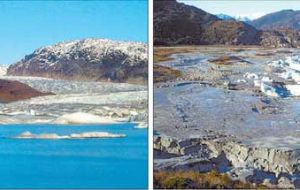MercoPress. South Atlantic News Agency
Glacial Lake disappearance in Chile baffles scientists
 “The lake had simply disappeared. No one knows what happened.”
“The lake had simply disappeared. No one knows what happened.” A glacial lake in Chile's southern Andes has disappeared, and scientists want to know why. The disappearance of the five-acre lake in the Huemules National Park was discovered in late May by park rangers.
Where the lake had been in March, they found a dry crater 30 meters deep, as well as several large pieces of ice that used to float atop the water. "The lake had simply disappeared," said Juan Jose Romero, regional head of Chile's national forest service, or Conaf. "No one knows what happened." Conaf plans a multidisciplinary expedition to the lake and promised a detailed explanation for its disappearance within a month, reports the Chilean daily El Mercurio. Some experts are attributing the lake disappearance to the affects of global warming, while others blame it on a recent earthquake that struck the Aisen region in southern Chile a month ago, adds El Mercurio. But Sergio Sepulveda, of the Geology Department at the University of Chile, shot down the direct link to global warming. Global warming could have melted the ice and increased water levels, which, in turn, could have put pressure on the glacial lake's walls and caused a break, he said. But global warming is not going to cause the lake to disappear in one month, added Sepulveda. A river seven to eight kilometers long, 40 meters wide that flowed out of the lake was reduced to a trickle. The vanishing of the lake occurred sometime during the four to six weeks rangers round of the park which is an area with protected autochthonous huemules (Hippocamelus bisulcus) also known as South Andes deer.




Top Comments
Disclaimer & comment rulesCommenting for this story is now closed.
If you have a Facebook account, become a fan and comment on our Facebook Page!